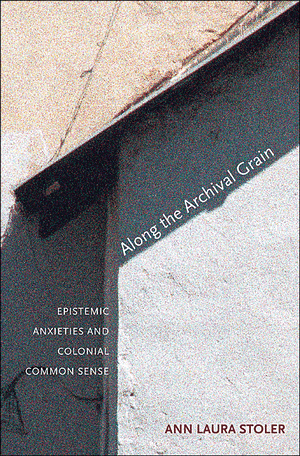Michael Taussig: Mimesis and Alterity: A Particular History of the Senses (1993)
Filed under book | Tags: · alterity, anthropology, colonialism, ethnography, mimesis, racism, society

In his most ambitious and accomplished work to date, Michael Taussig undertakes a history of mimesis, the practice of imitation, and its relation to alterity, the opposition of Self and Other. Drawing upon such diverse sources as theories of Benjamin, Adorno and Horckheimer, research on the Cuna Indians, and theories of colonialism and postcolonialism, Taussig shows that the history of mimesis is deeply tied to colonialism, and more specifically, to the colonial trade’s construction of “savages.” With analysis that is vigorous, unorthodox, and often breathtaking, Taussig’s cross-cultural discussion of mimesis deepens our understanding of the relationship between ethnography, racism and society.
Publisher Routledge, New York/London, 1993
ISBN 0415906873, 9780415906876
320 pages
Margaret Lock, Judith Farquhar (eds.): Beyond the Body Proper: Reading the Anthropology of Material Life (2007)
Filed under book | Tags: · biology, body, ethnography, everyday, gender, life, phenomenology, science, sex, social theory, women

“Over the past several decades, scholars in both the social sciences and humanities have moved beyond the idea that there is a “body proper”: a singular, discrete biological organism with an individual psyche. They have begun to perceive embodiment as dynamic rather than static, as experiences that vary over time and across the world as they are shaped by discourses, institutions, practices, technologies, and ideologies. What has emerged is a multiplicity of bodies, inviting a great many disciplinary points of view and modes of interpretation. The forty-seven readings presented in this volume range from classic works of social theory, history, and ethnography to more recent investigations into historical and contemporary modes of embodiment.
Beyond the Body Proper includes nine sections conceptually organized around themes such as everyday life, sex and gender, and science. Each section is preceded by interpretive commentary by the volume’s editors. Within the collection are articles and book excerpts focused on bodies using tools and participating in rituals, on bodies walking and eating, and on the female circumcision controversy, as well as pieces on medical classifications, spirit possession, the commodification of body parts, in vitro fertilization, and an artist/anatomist’s “plastination” of cadavers for display. Materialist, phenomenological, and feminist perspectives on embodiment appear along with writings on interpretations of pain and the changing meanings of sexual intercourse. Essays on these topics and many others challenge Eurocentric assumptions about the body as they speak to each other and to the most influential contemporary trends in the human sciences.”
With contributions by Henry Abelove, Walter Benjamin, Janice Boddy, John Boswell, Judith Butler, Caroline Walker Bynum, Stuart Cosgrove, Michel de Certeau, Gilles Deleuze, Alice Domurat Dreger, Barbara Duden, Friedrich Engels, E. E. Evans-Pritchard, Judith Farquhar, Marcel Granet, Felix Guattari, Ian Hacking, Robert Hertz, Patricia Leyland Kaufert, Arthur Kleinman, Shigehisa Kuriyama, Jean Langford, Bruno Latour, Margaret Lock, Emily Martin, Karl Marx, Marcel Mauss, Maurice Merleau-Ponty, Nancy K. Miller, Lisa Jean Moore, John D. O’Neil, Aihwa Ong, Mariella Pandolfi, Susan Pedersen, Gregory M. Pflugfelder, Rayna Rapp, Nancy Scheper-Hughes, Kristofer Schipper, Matthew Schmidt, Peter Stallybrass, Michael Taussig, Charis Thompson, E.P. Thompson, Anna Lowenhaupt Tsing, Victor Turner, Terence Turner, Jose van Dijck, Keith Wailoo, Brad Weiss, Allon White
Publisher Duke University Press, 2007
Body, Commodity, Text: Studies of Objectifying Practice series
ISBN 0822338459, 9780822338451
688 pages
PDF (119 MB, updated on 2019-8-16)
Comments (2)Ann Laura Stoler: Along the Archival Grain: Epistemic Anxieties and Colonial Common Sense (2010)
Filed under book | Tags: · archive, colonialism, ethnography, governance, history, politics

“Along the Archival Grain offers a unique methodological and analytic opening to the affective registers of imperial governance and the political content of archival forms. In a series of nuanced mediations on the nature of colonial documents from the nineteenth-century Netherlands Indies, Ann Laura Stoler identifies the social epistemologies that guided perception and practice, revealing the problematic racial ontologies of that confused epistemic space.
Navigating familiar and extraordinary paths through the lettered lives of those who ruled, she seizes on moments when common sense failed and prevailing categories no longer seemed to work. She asks not what colonial agents knew, but what happened when what they thought they knew they found they did not. Rejecting the notion that archival labor be approached as an extractive enterprise, Stoler sets her sights on archival production as a consequential act of governance, as a field of force with violent effect, and not least as a vivid space to do ethnography.”
Publisher Princeton University Press, 2010
ISBN 0691146365, 9780691146362
314 pages
PDF (updated on 2016-10-13)
Comments (4)
